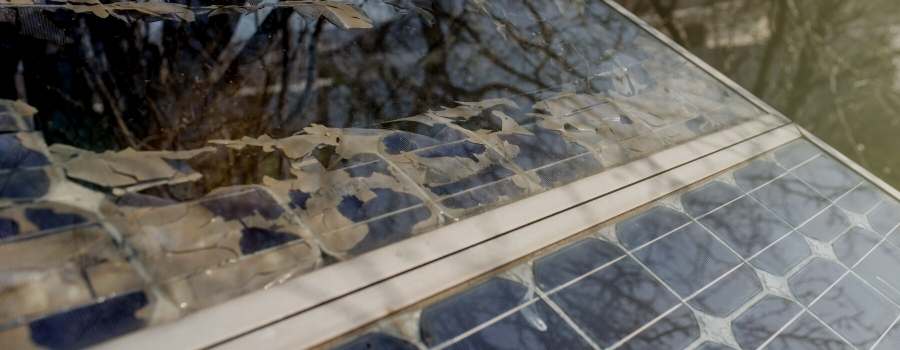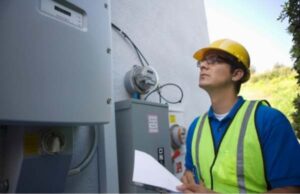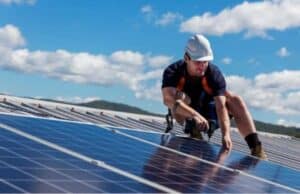
If you have solar panels installed at your home, it’s important to know how to check if they’re working properly. Solar panels rely on sun exposure to create energy, so there are a few things you can do to troubleshoot them.
In this post, I will go over 9 ways to check if your solar panels are working correctly and answer a few related questions.
- Double Check Solar Inverters
- Make Sure Your Batteries Are In Good Condition
- Weather Factors
- Keep Those Solar Panels Clean
- Regularly Check Panels For Micro-cracks and Broken Wires
- Check Your Solar Meter
- Keep A Close Record Of Your Electric Bill
- Have Your Solar Company Inspect Your System
- Use A Solar Monitoring App
1. Double Check Your Solar Inverters
The inverters are the most important part of your solar panel system, as they convert the direct current (DC) generated by the solar panels into alternating current (AC) that can be used in your home.
If you’re unsure if your inverters are working, there are a few things you can do:
- Check the indicator light on the inverter
- Listen for a humming noise, which indicates that the inverter is working
- Look to see if the fan on the inverter is running
If you’re still unsure, you can call your solar company and ask them to check the inverters for you.
For more information on various Inverters, check out this article.
2. Make Sure Your Batteries Are In Good Condition

Maybe your solar panels are working just fine but you are still experiencing problems. It’s possible that your batteries are the cause of your issue. To check the condition of your batteries:
- Check the electrolyte levels
- Look for signs of corrosion on the battery terminals
- Make sure there is no water in the battery cells
- Test the battery voltage with a voltmeter
If any of these tests show that your batteries need to be replaced, you should contact a solar company for assistance.
If you think your battery might be the problem, here are a few more articles to check out:
3. Weather Factors
Weather is another elements that can interfere with how well your solar panels are working. Solar panels rely on direct sunlight to create energy, so if there is too much cloud cover or rain, they will not produce any power.
Unless your cloud cover is persistent, then I wouldn’t worry too much about the weather hurting our solar output too much. Chances are if you are experiencing losses for an extended period of time, cloudy or rainy weather isn’t the culprit.
On the other hand, If you live somewhere that gets snow cover for several weeks or months at a time, then you can expect that to impact your solar output. Since these places are farther north, the amount of sunlight is quite a bit lower than it is in warmer places.
Still, even with the snow being on the ground, there are a few things you can do to keep your solar output as high as possible…the main thing being to keep the snow and ice from building up on your solar panels. Snow and ice build-up is a perfect way to lower your solar energy output AND damage your solar panels.
4. Keep Those Solar Panels Clean
If your solar panels are not clean, they will not be able to generate as much energy as they could if they were clean. Solar panels should be cleaned at least once a month, or more often if they are dirty.

Dust, grime, leaves, and dirt can have the same impact that snow and ice will have. It blocks the photovoltaic cells from receiving all the sunlight they need to run at peak efficiency.
Add to this that heavier debris such as sticks, limbs, and mud can create scratches and micro-fractures which will lead to long-term costly issues.
You can clean your solar panels with a soft cloth and warm water, or you can use a cleaning solution made for solar panels. Be sure to rinse the panels off completely afterward.
5. Regularly Check Panels For Micro-Cracks and Broken Wires
It’s important to regularly check your solar panels for any signs of damage, such as micro-cracks or broken wires.
While a micro-crack or small fracture won’t render your solar panel useless…much the same way as a windshield crack on your car isn’t a huge deal at first…over time this crack can spread or “spider-web” out, further restricting the amount of efficiency your panels produce.
This also means that the structural integrity of your panels will start to diminish. Not that you should walk on your solar panel… a topic I cover in more detail over here…but sometimes an unavoidable step has to happen. If your panels are already weakened, then even a slight bit of added weight can cause serious damage.
And it doesn’t even have to be a person’s weight that can damage your solar panels, up above I mentioned snow and ice buildup…wet snow is WAY heavier than people realize, add to this the colder temperature making glass, plastics, and metals more brittle and have just a few inches on top of already cracked solar panels can lead to costly repairs and replacements.
If you find any damage, you should contact a solar company immediately for repairs.
6. Check Your Solar Meter
Your solar meter is another way to measure how much energy your solar panels are producing. You can find your solar meter on the side of your house, near your electric meter.

You read a solar, or smart reader in much the same way as a standard electrical meter…however, there may be some different codes you’ll need to learn or look up, especially if you think you may be losing solar efficiency.
But, as a basic lesson…it’s always a good idea to track your solar usage each month to see if you have any serious fluctuations, remembering to account for particularly hot or cold days you may be blasting the climate control a bit more.
This will give you an average and helps spikes (either low or high) show much more clearly and may help you identify when and what the issue might be.
If you’re not sure how to read your solar meter, you can contact your solar company for assistance.
7. Keep A Close Record Of Your Electric Bill
It’s a good idea to keep a close record of your monthly electric bills, especially if you have solar panels. This will help you to track how much energy your solar panels are producing and how much money you’re saving on your electric bill.
Over time you will see your bill diminish, a topic I cover over here in this article, and it may be possible to sell some energy back to your local utility, which is covered here in this article.
Keep in mind that monitoring your electric bill IS NOT a foolproof way to determine if your panels are working.
Your solar panels may be working correctly, but your electric bill could still be high if you’re using a lot of electricity. It’s going to depend on how much, if any, of your home is stilled tied to your city’s electrical utility.
So don’t rely on any one of these tips and use as many as you can before calling professionals for costly repairs.
8. Have Your Solar Company Inspect Your System

If you’re not sure if your solar panels are working correctly, you can have your solar company inspect your system.
They will be able to tell you if there is anything wrong with your system and will offer suggestions for how to fix it.
Many professionals and homeowners agree that you should have your solar array inspected once a year.
You may want to coordinate this with when you clean your panels, that way you’re also putting eyes on your system and learning what to look for.
You can expect to pay between $150 and $200 for a routine inspection…not a huge sum of money and it can save you thousands in repairs.
9. Use A Solar Monitoring App
If you want to keep track of how much energy your solar panels are producing, you can use a solar monitoring app. This app will show you how much power your solar panels are generating on a daily, weekly, or monthly basis.
These apps essentially give you the same info that the smart reader on the side of your house gives, but with the added convenience of translating codes for you and letting you check how your home’s solar array is doing from anywhere in the world.
Many of these apps will also allow you to compile information so that you can keep reports for your own peace of mind or, if linked to a company, allow the company to compile information and receive alerts.
How Do I Know If My Solar Panels Are Working?
In general, your solar panels should be giving a consistent output of energy each month depending on your home’s power usage. Faulty or broken equipment, as well as dirty solar panels, can cause the efficiency of your solar array to diminish.
If you’re still not sure if your solar panels are working, the best thing to do is call a professional. They will be able to inspect your system and tell you what’s wrong with it. If you have any of the tips from this article, try using them before calling for help. It may save you some money in the long run.
If your solar panels are not clean, they will not be able to generate as much energy as they could if they were clean. Solar panels should be cleaned several times a year and inspected by professionals yearly.
How Can You Tell if Your Solar Panels Are Producing Enough Energy?
To determine if your solar panels are generating sufficient energy, there are several key indicators you can rely on.
- Electric Bills: Regularly monitor your electricity bills to observe any significant decrease in your energy expenses, indicating that your solar panels are effectively offsetting your electricity usage.
- Monitoring System: You can install a solar energy monitoring system that provides real-time data on your panel’s performance, enabling you to track energy production and identify any fluctuations or abnormalities.
- Compare Estimates: Compare your actual energy generation with the estimated values provided by your solar installer or manufacturer.
What Can Reduce Solar Energy Output?
Several factors can contribute to a reduction in solar energy output. It’s important to be aware of these potential issues and address them promptly to maximize the efficiency of your solar panel system. Here are some key factors that can reduce solar energy output:
- Shading: Objects such as trees, buildings, or nearby structures that cast shadows on the solar panels can significantly diminish their performance.
- Dirt and Debris: Accumulation of dust, dirt, leaves, or other debris on the surface of the solar panels can block sunlight and hinder their ability to generate electricity.
- Snow or Ice: During winter months, a buildup of snow or ice on the panels can temporarily impede sunlight absorption and reduce energy production.
- Aging or Damaged Components: As the solar panel system ages, components like inverters, wiring, or connectors may wear out or become damaged, leading to decreased efficiency.
- Electrical Issues: Faulty wiring connections, loose terminals, or other electrical problems can disrupt the flow of electricity and result in reduced energy output.
- Weather Conditions: Extreme weather conditions such as heavy cloud cover, overcast skies, or low light conditions can reduce the amount of sunlight reaching the panels, impacting energy generation.
Ways to Maintain Optimal Solar Energy Output
- Regularly inspect your solar panels for shading issues caused by surrounding objects.
- Keep the panels clean by removing dirt, dust, and debris to ensure maximum sunlight absorption.
- Clear snow or ice from the panels during winter months to restore energy production.
- Monitor the performance of aging components and replace or repair them as needed.
- Schedule regular maintenance checks to identify and address any electrical issues.
- Stay informed about weather conditions that may affect solar energy generation and adjust expectations accordingly.
Why is it Important to Check if Your Solar Panels are Working?
Regularly checking the performance of your solar panels is critical to ensure optimal energy production, maximize savings, maintain warranty compliance, and contribute to a greener future.
Monitoring their functionality allows you to detect issues early on, address inefficiencies, and track your energy generation patterns for informed decision-making.
Not only does checking help ensure that you are maximizing the benefits of your investment, but it also allows you to identify and address any potential issues before they escalate.
Detect Problems
By monitoring the performance of your solar panels, you can promptly detect and resolve any problems, such as reduced energy production or damaged components, thus preventing further deterioration and costly repairs.
Over time, elements like dirt, dust, shading, or aging components can affect the efficiency of your solar panels, leading to reduced energy generation.
By regularly assessing the performance of your solar system, you can identify any inefficiencies and take appropriate actions, such as cleaning the panels or addressing shading issues, to maintain peak performance.
This proactive approach helps ensure that you’re harnessing the maximum potential of solar energy and reaping the financial benefits it offers.
Expands Solar Panel Life
Monitoring the functionality of your solar panels also plays a vital role in ensuring the longevity and warranty compliance of your system.
Most solar panel manufacturers provide warranties that guarantee a certain level of performance over a specific period. By regularly checking your panels, you can detect any deviations from the expected output and address them promptly to safeguard your warranty coverage.
Environmental Sustainability
Solar energy is a clean and renewable source of power, and by monitoring your panels, you can confirm that you’re effectively reducing your carbon footprint and minimizing reliance on fossil fuels.
Regularly assessing the performance of your solar panels also lets you track your energy production and consumption patterns.
By monitoring your system’s output, you can identify any unusual fluctuations or changes in energy generation, enabling you to investigate potential causes such as faulty equipment or increased energy usage.
This information allows you to make informed decisions about energy efficiency improvements and adjust your consumption habits accordingly, leading to further cost savings and a more sustainable energy usage lifestyle.

